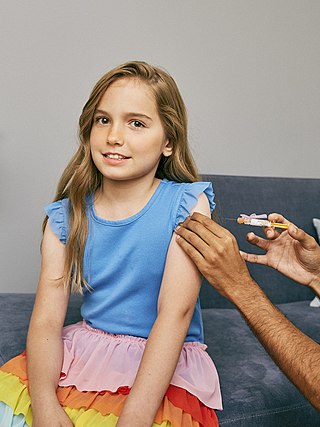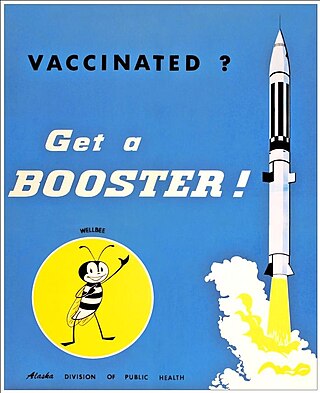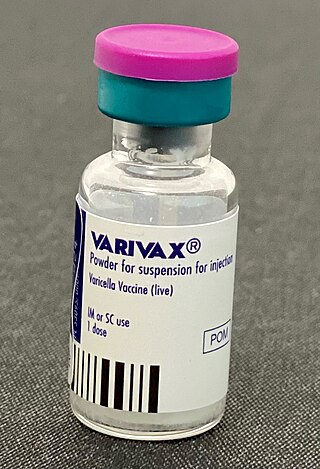Related Research Articles

The Centers for Disease Control and Prevention (CDC) is the national public health agency of the United States. It is a United States federal agency under the Department of Health and Human Services, and is headquartered in Atlanta, Georgia.

Vaccination is the administration of a vaccine to help the immune system develop immunity from a disease. Vaccines contain a microorganism or virus in a weakened, live or killed state, or proteins or toxins from the organism. In stimulating the body's adaptive immunity, they help prevent sickness from an infectious disease. When a sufficiently large percentage of a population has been vaccinated, herd immunity results. Herd immunity protects those who may be immunocompromised and cannot get a vaccine because even a weakened version would harm them. The effectiveness of vaccination has been widely studied and verified. Vaccination is the most effective method of preventing infectious diseases; widespread immunity due to vaccination is largely responsible for the worldwide eradication of smallpox and the elimination of diseases such as polio and tetanus from much of the world. However, some diseases, such as measles outbreaks in America, have seen rising cases due to relatively low vaccination rates in the 2010s – attributed, in part, to vaccine hesitancy. According to the World Health Organization, vaccination prevents 3.5–5 million deaths per year.

A vaccine is a biological preparation that provides active acquired immunity to a particular infectious or malignant disease. The safety and effectiveness of vaccines has been widely studied and verified. A vaccine typically contains an agent that resembles a disease-causing microorganism and is often made from weakened or killed forms of the microbe, its toxins, or one of its surface proteins. The agent stimulates the body's immune system to recognize the agent as a threat, destroy it, and recognize further and destroy any of the microorganisms associated with that agent that it may encounter in the future.

Pneumococcal polysaccharide vaccine, sold under the brand name Pneumovax 23, is a pneumococcal vaccine that is used for the prevention of pneumococcal disease caused by the 23 serotypes of Streptococcus pneumoniae contained in the vaccine as capsular polysaccharides. It is given by intramuscular or subcutaneous injection.

Paul Allan Offit is an American pediatrician specializing in infectious diseases, vaccines, immunology, and virology. He is the co-inventor of a rotavirus vaccine. Offit is the Maurice R. Hilleman Professor of Vaccinology, professor of pediatrics at the Perelman School of Medicine at the University of Pennsylvania, former chief of the Division of Infectious Diseases (1992–2014), and the director of the Vaccine Education Center at the Children's Hospital of Philadelphia.
Neal A. Halsey is an American pediatrician, with sub-specialty training in infectious diseases, international health and epidemiology. Halsey is a professor emeritus of international health and director emeritus of the Institute for Vaccine Safety at the Johns Hopkins Bloomberg School of Public Health, in Baltimore, Maryland. He had a joint appointment in the Department of Pediatrics at the Johns Hopkins School of Medicine and serves as co-director of the Center for Disease Studies and Control in Guatemala.
The MMRV vaccine combines the attenuated virus MMR vaccine with the addition of the chickenpox vaccine or varicella vaccine. The MMRV vaccine is typically given to children between one and two years of age.

A booster dose is an extra administration of a vaccine after an earlier (primer) dose. After initial immunization, a booster provides a re-exposure to the immunizing antigen. It is intended to increase immunity against that antigen back to protective levels after memory against that antigen has declined through time. For example, tetanus shot boosters are often recommended every 10 years, by which point memory cells specific against tetanus lose their function or undergo apoptosis.

Varicella vaccine, also known as chickenpox vaccine, is a vaccine that protects against chickenpox. One dose of vaccine prevents 95% of moderate disease and 100% of severe disease. Two doses of vaccine are more effective than one. If given to those who are not immune within five days of exposure to chickenpox it prevents most cases of disease. Vaccinating a large portion of the population also protects those who are not vaccinated. It is given by injection just under the skin. Another vaccine, known as zoster vaccine, is used to prevent diseases caused by the same virus – the varicella zoster virus.

Pneumococcal vaccines are vaccines against the bacterium Streptococcus pneumoniae. Their use can prevent some cases of pneumonia, meningitis, and sepsis. There are two types of pneumococcal vaccines: conjugate vaccines and polysaccharide vaccines. They are given by injection either into a muscle or just under the skin.

Katherine "Kate" L. O'Brien is a Canadian American pediatric infectious disease physician, epidemiologist, and vaccinologist who specializes in the areas of pneumococcal epidemiology, pneumococcal vaccine trials and impact studies, and surveillance for pneumococcal disease. She is also known as an expert in infectious diseases in American Indian populations. O’Brien is currently the Director of the World Health Organization's Department of Immunization, Vaccines and Biologicals.

Anne Schuchat is an American medical doctor. She is a former rear admiral and assistant surgeon general in the United States Public Health Service Commissioned Corps. She also served as the principal deputy director of the Centers for Disease Control and Prevention (CDC). In May 2021, Schuchat stepped down from her post.
Frank DeStefano FACPM is a medical epidemiologist and researcher at the Centers for Disease Control and Prevention, where he is director of the Immunization Safety Office.
Walter A. Orenstein served as the director of the United States' National Immunization Program, from May 1993 to January 2004.

The Moderna COVID‑19 vaccine, sold under the brand name Spikevax, is a COVID-19 vaccine developed by American company Moderna, the United States National Institute of Allergy and Infectious Diseases (NIAID), and the Biomedical Advanced Research and Development Authority (BARDA). Depending on the jurisdiction, it is authorized for use in people aged six months, twelve years, or eighteen years and older. It provides protection against COVID-19 which is caused by infection by the SARS-CoV-2 virus. It is designed to be administered as two or three 0.5 mL doses given by intramuscular injection at an interval of at least 28 days apart.

Nancy Messonnier is an American physician who served as the director of the National Center for Immunization and Respiratory Diseases at the Centers for Disease Control and Prevention from 2016 to 2021. She worked on the CDC's response to the COVID-19 pandemic in the United States.
Allison Joan McGeer is a Canadian infectious disease specialist in the Sinai Health System, and a professor in the Department of Laboratory Medicine and Pathobiology at the University of Toronto. She also appointed at the Dalla Lana School of Public Health and a Senior Clinician Scientist at the Lunenfeld-Tanenbaum Research Institute, and is a partner of the National Collaborating Centre for Infectious Diseases. McGeer has led investigations into the severe acute respiratory syndrome outbreak in Toronto and worked alongside Donald Low. During the COVID-19 pandemic, McGeer has studied how SARS-CoV-2 survives in the air and has served on several provincial committees advising aspects of the Government of Ontario's pandemic response.

Rochelle Paula Walensky is an American physician-scientist who served as the director of the U.S. Centers for Disease Control and Prevention from 2021 to 2023 and had also served as the administrator of the Agency for Toxic Substances and Disease Registry in her capacity as the director of the U.S. Centers for Disease Control and Prevention from 2021 to 2023. On May 5, 2023, she announced her resignation, effective June 30, 2023. Prior to her appointment at the CDC, she had served as the chief of the Division of Infectious Diseases at Massachusetts General Hospital and a professor of medicine at Harvard Medical School. Walensky is an expert on HIV/AIDS.
Penny M. Heaton is an American physician who is the Global Therapeutics Lead for Vaccines at Johnson & Johnson. She previously worked at Novavax, Novartis and the Bill & Melinda Gates Foundation. She was included by Stat News on their definitive list of leaders in the life sciences in 2022.
Janet Gilsdorf is an American pediatric infectious diseases physician, scientist, and writer at the University of Michigan. Her research has focused on the pathogenic, molecular, and epidemiologic features of the bacterium Haemophilus influenzae. She served as the Director of the Division of Pediatric Infectious Diseases in the University of Michigan Health System from 1989 to 2012 and Co-Director of the Center for Molecular and Clinical Epidemiology of Infectious Diseases at the School of Public Health at the University of Michigan from 2000 – 2015. In addition to her scientific publications, she is also the author of two novels, one memoir, one non-fiction book, and a number of medically-oriented essays.
References
- ↑ "Melinda Wharton". ADVAC. Archived from the original on 2022-05-19.
- ↑ "Dr. Melinda Wharton, MD - Infectious Disease Specialist in Atlanta, GA | Healthgrades". www.healthgrades.com. Retrieved 2023-10-13.
- ↑ "Dr. Melinda Wharton, MD, Internal Medicine | Decatur, GA | WebMD". doctor.webmd.com. Retrieved 2023-10-13.
- ↑ "CDC Backs Extra Bivalent Booster for High-Risk Groups, Simplifies Vax Recs". medpagetoday.com.
- ↑ "NCIRD Organizational Structure". cdc.gov. 11 September 2023.
- ↑ "The Vaccine War". FRONTLINE. Retrieved 2023-10-13.
- ↑ Kimball, Spencer (2023-01-26). "FDA advisors recommend replacing original Covid vaccine with bivalent omicron shots for all doses". CNBC. Retrieved 2023-10-13.
- ↑ Stern, Gavin (2015-11-16). "2015 AAAS Fellows Recognized for Contributions to Advancing Science". AAAS. Retrieved 2023-10-18.